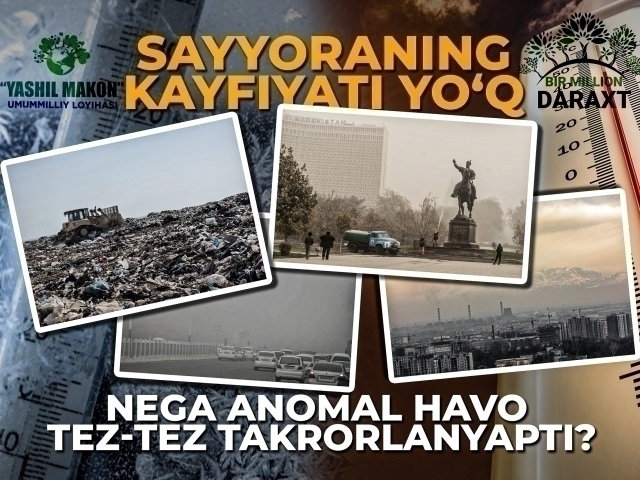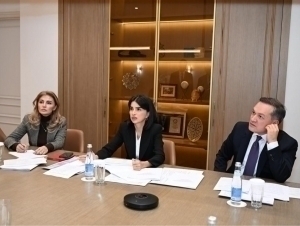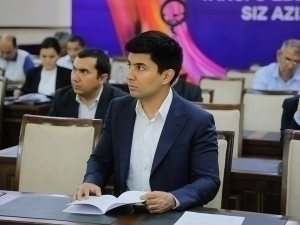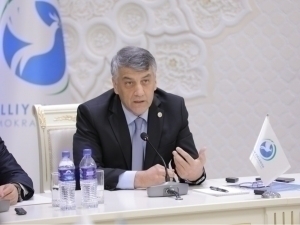Hotter summers, warmer winters: Climate shifts in Uzbekistan
Interviews
−
21 February 2025 22446 7 minutes
Climate change poses the biggest threat to human health. Its impacts are already damaging health through air pollution, diseases, extreme weather events, forced displacement, food insecurity, and stress on mental health. Environmental factors claim the lives of about 13 million people every year.
There is no sector in the world where climate change has not had its impact. We obtained expert opinions on climate change, its causes and consequences, and the extent to which Uzbekistan's strategies for protecting the environment are justified in the current situation.
Iqbol Ergashova, Correspondent: — In what ways is climate change presenting itself in Uzbekistan?
Erkin Abdulahadov, climatologist: — Climate change is not new to humanity. Since our planet was created, it has experienced very cold and very hot periods. Even Antarctica had a green period with life. However, after the 17th-18th centuries, with the development of human life, living standards, and the industrial revolution, climate change accelerated, reaching a high indicator for the last 300-500 years. Some experts attribute this to anthropogenic (human activity) factors, while others believe it is a natural process (an increase in water vapor in the atmosphere). Nonetheless, climatologists agree that temperatures are rising faster than before. The environment and weather conditions we have long been accustomed to are being replaced. This process is evident in the unusual change of seasons. In Uzbekistan, for example, the temperature increase is noticeable in summer and winter, and almost imperceptible in spring and autumn. Nowadays, there is less snowfall in winter, and people can walk without hats, scarves, or gloves without feeling cold. Previously, we dressed warmly during winter, but now lighter clothing suffices. The summer months are also 2-3 degrees warmer than before. Overall, Uzbekistan has experienced a temperature increase of 1.5-2 degrees compared to the long-term climate norm. While the global average is 1.5 degrees, Uzbekistan's location means we experience an increase closer to 2 degrees, slightly higher than other regions.

Uzbekistan has a sharply variable continental climate. Almost 4/5 of the country's territory consists of semi-deserts and deserts, with the rest being high mountains in the southeastern and eastern regions. The continental climate is influenced by geographical location, solar radiation, and atmospheric circulation, characterized by long droughts, hot summers, rainy springs, and unstable winters. It is an area prone to various air currents.
I.E.: — Why do unusual weather patterns occur so frequently?
E.A.: — Anomalous weather conditions refer to the occurrence of different weather forms, both short and long, instead of past weather patterns. In meteorology, rare events observed in the last thirty years are considered abnormal. For instance, unexpected snowfall in Egypt and North Africa does not indicate a general cold snap. Warm and hot weather is prevalent globally, but unusual processes due to changes in air currents' physics cause anomalies in specific regions. Anomalous phenomena have increased worldwide, not just in Uzbekistan. Located far from oceans, Uzbekistan rarely experiences anomalies related to floods and landslides. Long-term anomalous cold or hot weather is also uncommon. While we experienced prolonged anomalous cold in January 2023, our region is generally not prone to various anomalies. However, dust-related anomalies, such as increased dust mass in the air and dust storms, have become more frequent. Unfortunately, rare events in the past century are becoming more common, especially dust and drought-related processes.
On November 4, 2021, strong winds and sandstorms occurred in various regions of Uzbekistan, including Tashkent City, Syrdarya, and Bukhara regions, reducing visibility to 500 to 1,000 meters. The concentration of dust in the air exceeded the established norm by five times. The Hydrometeorological Center reported that such levels of dust had not been seen in Uzbekistan for 150 years.
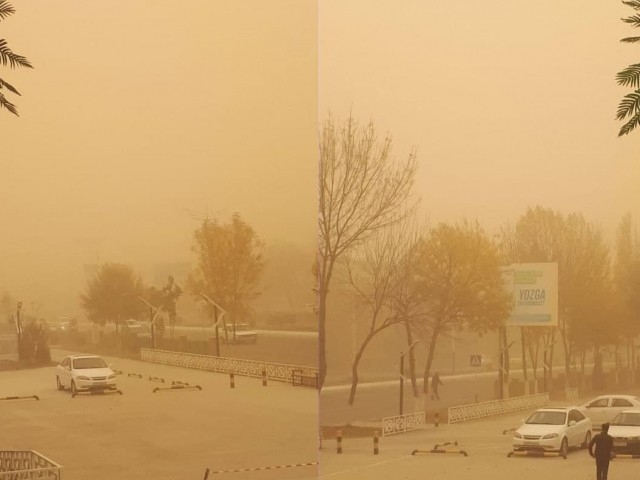
One of the main reasons for the acceleration of climate change is greenhouse gases. Greenhouse gases accumulate in the atmosphere and trap heat from the earth's surface, naturally increasing the planet's temperature. This process is called the greenhouse effect. Waste that is not recycled, emits methane gas or is burned (due to improper processes in landfills) contributes significantly to climate change through the greenhouse effect.
Iqbol Ergashova, correspondent: — How can we improve waste sorting and environmental culture in society? How effective do you think the nationwide movement “One Million Green Families” is in this regard?
Nargis Qosimova, eco-journalist: — The culture of waste sorting should start with the family to be effective. In Uzbekistan, only 20-22 percent of waste is recycled; the rest is taken to landfills and dumped. Unfortunately, landfills do not meet international standards, and waste is mostly buried. Those that are not buried fly around when the wind blows, creating an ugly scene. Even when buried, waste burning in the summer due to methane gas formation contributes to atmospheric pollution.
Many people believe that "even if we sort our waste, it will still be thrown in the same place." This is almost true, but failure to sort and recycle waste creates major environmental problems. To solve this issue, fines need to be increased. Our people will take action when "hit in the pocket." For example, after increasing fines in the transport sector, the situation became more orderly. The same measures should be taken for waste management. Additionally, environmental education starting from kindergartens is necessary. Unfortunately, we do not have environmental subjects in kindergartens or schools. The Ministry of School and Preschool Education informed us that they are integrating ecology into other subjects, adding 1-2 hours of ecology lessons to several subjects. However, science teachers may not know about ecology, making the allocated hours useless. Ecology should be introduced as a separate subject, gradually increasing in complexity based on each class's mastery ability. This is one of the main ways to increase the culture of waste sorting among the population. Proper education about ecology is essential for people to understand the negative impact of waste on humanity's future.
Uzbekistan generates an average of 6.8 million tons of household waste per year. In recent years, over 90 percent of neighborhoods have been covered by sanitary cleaning services. However, the level of waste recycling remains low, with only 313 such enterprises currently operating.
Regarding the nationwide movement "One Million Green Families," it is a good idea and may have some effect, but I do not believe it will be 100 percent effective. Our ecological culture, awareness, and consciousness are not fully formed. Therefore, a nationwide movement may not bear fruit quickly. While it is good that incentives are provided, corruption may interfere. Many people already hold this opinion. As a journalist, I do not believe this movement will have a significant impact.
On November 20, 2024, at a meeting of the Legislative Chamber of the Oliy Majlis, Shavkat Mirziyoyev proposed declaring 2025 the “Year of Environmental Protection and the ‘Green’ Economy”. This initiative received full support.
Iqbol Ergashova, correspondent: — As an eco-activist, what are your expectations from 2025, which is called the “Year of Environmental Protection and the ‘Green’ Economy”?
Nargis Qosimova, eco-journalist: — Naming the year and adopting the annual program is a huge event for Uzbekistan. I am very happy about this. It would be beneficial if ecology were added to each of the coming years, such as the year of "youth and ecology," "entrepreneurship and ecology," or "education and ecology." I hope that this year will focus on ecology and help form environmental awareness among our population.
Live
All